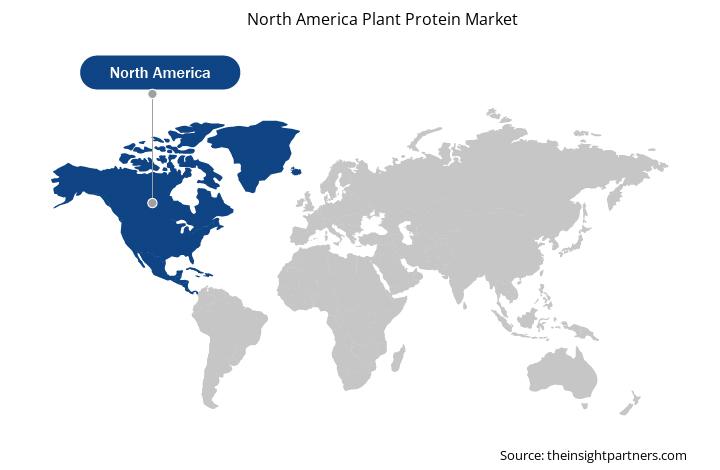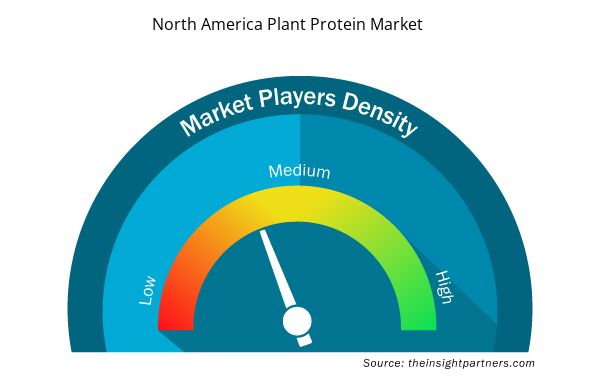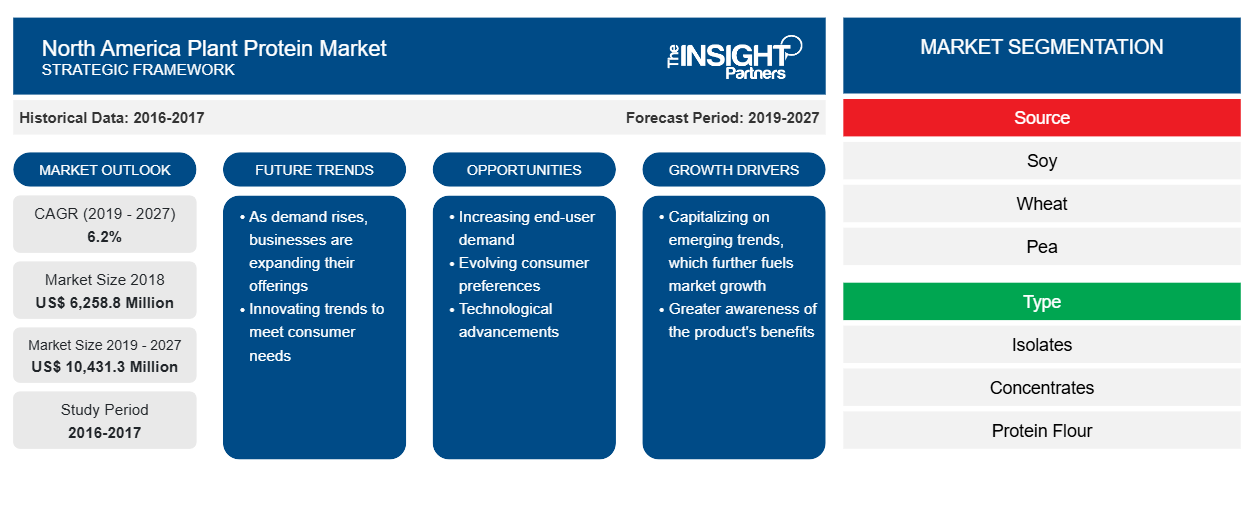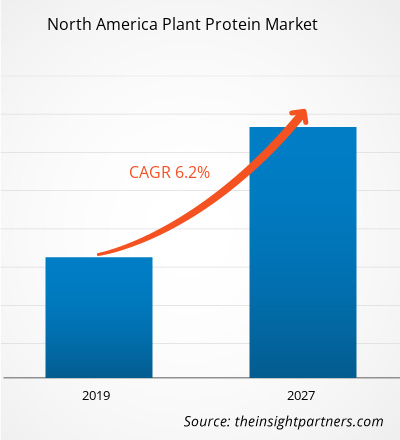The North America plant protein market accounted for US$ 6,258.8 Mn in 2018 and is predicted to grow at a CAGR of 6.2% during the forecast period 2019 – 2027, to account for US$ 10,431.3 Mn by 2027.
Plant protein is a natural protein derived from plant sources such as soy, wheat, pea, and others. Plant protein provides building blocks for healthy muscles and tissues in the human body and is also beneficial for weight loss. Plant-based proteins tend to be lower in calories and fat as compared to animal proteins but higher in fiber and essential nutrients.
In 2018, US dominates the North America plant protein market, followed by Canada. US is among the developed and the most industrialized countries across the North America. The US is a major economy in the region that captures maximum of the plant protein industry market share. The application of plant proteins across dietary supplements is growing at a faster rate, and a similar trend is followed by the food industry. The demand for plant proteins in US is driven by a growing demand for alternative protein types that are more sustainable, clean and creates less environmental impact during production. Additionally, plant proteins contain low cholesterol and saturated fat, and it contains a high nutritional value, which appeals to health-conscious consumers in developed countries. Moreover, rising awareness about the vegan protein, especially among the adult age group, is rising not only in the US and Canada but also in Mexico. These factors further propel the demand for plant protein in the North America region. The food and beverage manufacturers in the region are experimenting to use healthy ingredients across various segments such as bakery, meat alternative, dairy alternative, processed food, confectionery, drinks, juices, etc. in order to enhance the taste, flavor, appearance and nutritional value which would also aid the growth of plant protein market.
North America Plant Protein Market

- This FREE sample will include data analysis, ranging from market trends to estimates and forecasts.
- This FREE sample will include data analysis, ranging from market trends to estimates and forecasts.
Market Insights
Rising consumer awareness about protein-rich food
Proteins are building blocks to maintain the structure and functions of the human body. Proteins are made up of amino acids that are attached by peptide bonds in long chains. There are 20 different kinds of amino acids linked together that determines the role of protein in the human body. Proteins play a key role in transporting molecules throughout the body by helping in cell repair and protecting the body from viruses and bacteria. It also promotes proper growth and development in children, teenagers, and pregnant women. People consuming more protein tend to maintain bone mass better and have a much lower risk of osteoporosis and fractures. High protein intake has resulted in boosting metabolism that results in the burning of a high amount of calories. This further helps in proper weight management and weight loss. These benefits of protein are attracting consumers towards protein-rich food and beverages available in the market. This further creates a huge demand for plant proteins across North America.
Source Insights
Based on source, the North America plant protein market is bifurcated as soy, wheat, pea, and others. The soy segment led the North America plant protein market by source. Soy protein isolate is a highly refined form of soy protein, with a protein content of minimum 90%. It is made from defatted soy flour from which most of the non-protein components, including fats and carbohydrates, are removed. Soy protein powder is made from defatted soybean flakes washed in either alcohol or water to remove the sugars and dietary fibers. They are then dehydrated and ground into powder. Soy protein powder is used to make infant soy formulae, as well as a variety of meat and dairy alternatives. Soy protein concentrates typically contain 70% soy protein and is basically defatted soy flour without the water-soluble carbohydrates. This form of protein is made by removing part of the carbohydrates from dehulled and defatted soybeans. Soy flour is made by grinding soybeans into a fine powder.
Type Insights
The North America plat protein market is bifurcated based on type into isolates, concentrates, and protein flour. The concentrates segment held a significantly large share of the North America plant protein market in 2018. Plant protein concentrates are produced by extracting protein from various sources such as soy, wheat, pea, quinoa, oats, beans, and nuts. Using heat and acid or enzymes. These typically supply 60–80% protein, with the remaining 20–40% composed of fat and carbs. The concentrated plant protein is the least processed type of protein powder. Plant protein in the concentrated form helps the muscles to recover quickly from heavy exercise as it is absorbed quickly by the body. Therefore, easy availability of plant protein concentrates coupled with lower prices compared to plant protein isolates are the key factors boosting the market.
Application Insights
The North America plant protein market is bifurcated based on application into protein beverages, dairy alternatives, meat alternatives and meat extenders, protein bars, bakery, and others. The meat alternatives and meat extenders segment accounted for a major share in the North America plant protein market. Beans and legumes are affordable sources of plant protein that serve as a meat substitute. Soy is also among the major source for producing meat alternatives. Pea protein isolates are mainly used by meat-alternative manufacturers such as Daiya, Gardein, Ben & Jerry's, Beyond Meat, Just Mayo, and Ripple Foods, among others. Therefore, surge in demand and production for meat alternatives results in higher demand for plant proteins. The demand for meat alternatives is increasing due to growing health concerns among consumers and growing preference for vegan food. Further, rising obesity levels due to the consumption of meat and meat products have led to an increasing consumer preference for meat substitutes.
North America Plant Protein Market by Type

- This FREE sample will include data analysis, ranging from market trends to estimates and forecasts.
- This FREE sample will include data analysis, ranging from market trends to estimates and forecasts.
Customize This Report To Suit Your Requirement
You will get customization on any report - free of charge - including parts of this report, or country-level analysis, Excel Data pack, as well as avail great offers and discounts for start-ups & universities
- Get Top Key Market Trends of this report.This FREE sample will include data analysis, ranging from market trends to estimates and forecasts.
Customize This Report To Suit Your Requirement
You will get customization on any report - free of charge - including parts of this report, or country-level analysis, Excel Data pack, as well as avail great offers and discounts for start-ups & universities
- Get Top Key Market Trends of this report.This FREE sample will include data analysis, ranging from market trends to estimates and forecasts.
New product development, market initiatives and merger and acquisition were observed as the most adopted strategies in North America plant protein market. Few of the recent developments in the North America plant protein market are listed below:
2020:
Archer Daniels Midland (ADM) acquired natural plant-based extracts and ingredients manufacturer Yerbalatina Phytoactives to strengthen its position in the health and wellness market.
2019:
Marfrig Global Foods entered into an agreement with Archer Daniels Midland Company (ADM) for the manufacture and sale of vegetable protein-based products in Brazil.
2017:
US-based plant protein ingredients producer Axiom Foods launched its pea protein meat analogue at IFT in Las Vegas.NORTH AMERICA PLANT PROTEIN MARKET SEGMENTATION
North America Plant Protein Market - By Source
- Soy
- Wheat
- Pea
- Others
North America Plant Protein Market - By Type
- Isolates
- Concentrates
- Protein Flour
North America Plant Protein Market - By Application
- Protein Beverages
- Dairy Alternatives
- Meat Alternatives and Meat Extenders
- Protein Bars
- Bakery
- Others
North America Plant Protein Market - By Country
- US
- Canada
- Mexico
Company Profiles
- E. I. Du Pont De Nemours and Company
- Archer Daniels Midland Company
- Kerry Group
- Koninklijke DSM N.V.
- Axiom Foods, Inc
- Cargill, Incorporated
- Roquette Frères
- Ingredion Incorporated
- Glanbia plc
- Burcon NutraScience Corporation
North America Plant Protein Market Regional Insights
The regional trends and factors influencing the North America Plant Protein Market throughout the forecast period have been thoroughly explained by the analysts at Insight Partners. This section also discusses North America Plant Protein Market segments and geography across North America, Europe, Asia Pacific, Middle East and Africa, and South and Central America.

- Get the Regional Specific Data for North America Plant Protein Market
North America Plant Protein Market Report Scope
| Report Attribute | Details |
|---|---|
| Market size in 2018 | US$ 6,258.8 Million |
| Market Size by 2027 | US$ 10,431.3 Million |
| Global CAGR (2019 - 2027) | 6.2% |
| Historical Data | 2016-2017 |
| Forecast period | 2019-2027 |
| Segments Covered |
By Source
|
| Regions and Countries Covered | North America
|
| Market leaders and key company profiles |
North America Plant Protein Market Players Density: Understanding Its Impact on Business Dynamics
The North America Plant Protein Market market is growing rapidly, driven by increasing end-user demand due to factors such as evolving consumer preferences, technological advancements, and greater awareness of the product's benefits. As demand rises, businesses are expanding their offerings, innovating to meet consumer needs, and capitalizing on emerging trends, which further fuels market growth.
Market players density refers to the distribution of firms or companies operating within a particular market or industry. It indicates how many competitors (market players) are present in a given market space relative to its size or total market value.
Major Companies operating in the North America Plant Protein Market are:
- E. I. Du Pont De Nemours and Company
- Archer Daniels Midland Company
- Kerry Group
- Koninklijke DSM N.V.
- Axiom Foods, Inc
Disclaimer: The companies listed above are not ranked in any particular order.

- Get the North America Plant Protein Market top key players overview
- Historical Analysis (2 Years), Base Year, Forecast (7 Years) with CAGR
- PEST and SWOT Analysis
- Market Size Value / Volume - Global, Regional, Country
- Industry and Competitive Landscape
- Excel Dataset
- Bioremediation Technology and Services Market
- Helicopters Market
- Underwater Connector Market
- Small Molecule Drug Discovery Market
- Malaria Treatment Market
- Aquaculture Market
- Pharmacovigilance and Drug Safety Software Market
- Cling Films Market
- Biopharmaceutical Contract Manufacturing Market
- Microplate Reader Market

Report Coverage
Revenue forecast, Company Analysis, Industry landscape, Growth factors, and Trends

Segment Covered
Source, Type, Application, and Countries

Regional Scope
North America, Europe, Asia Pacific, Middle East & Africa, South & Central America

Country Scope
US, Canada
Trends and growth analysis reports related to Food and Beverages : READ MORE..
The List of Companies - North America Plant Protein Market
- E. I. Du Pont De Nemours and Company
- Archer Daniels Midland Company
- Kerry Group
- Koninklijke DSM N.V.
- Axiom Foods, Inc
- Cargill, Incorporated
- Roquette Frères
- Ingredion Incorporated
- Glanbia plc
- Burcon NutraScience Corporation




 Get Free Sample For
Get Free Sample For